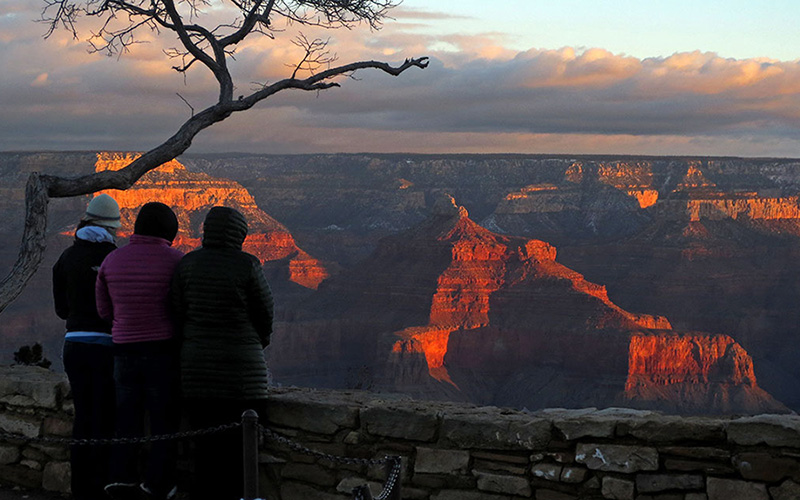
Grand Canyon National Park remains closed because of the COVID-19 pandemic, but many state and city parks and trails remain open. (Photo courtesy of National Park Service)
PHOENIX – Arizona’s outdoors continue to be a source of solace and relief during the COVID-19 pandemic. Although Grand Canyon National Park, Saguaro National Park and other national sites remain closed, state parks, the Phoenix Mountains Preserve and other popular hiking spots remain open with some restrictions.
Gov. Doug Ducey deemed outdoor recreation essential in his executive stay-at-home order on March 30, and parks and trails saw large numbers of visitors initially. Many state and city parks remain open but with safety measures, such as keeping 6 feet apart and avoiding congregating. Ducey this month extended his stay-home order until May 15, and allowed a limited number of businesses, including hair salons, to reopen with safety measures in place. That extension expires Friday.
Health and exercise experts say it’s safe to break a sweat outdoors if you take precautions and leave yourself “wiggle room” when encountering others. And you can always exercise from home, they add.
“Some of our parks have seen an increase in day use, which is people just going in there for the day to hike or just get outdoors,” said Michelle Thompson, chief of communications for Arizona State Parks & Trails. “There are a lot of people who are looking for ways to get out of the house that maybe they haven’t done before.”
Arizona State Parks, which oversees more than 30 recreational parks and historic sites, has kept all recreational parks, campgrounds and trails open, although gift shops, visitors centers and historic sites are closed.
Since mid-April, many state parks and trails have limited the number of people allowed on-site and erected signs that recommend visitors follow the guidelines provided by the federal Centers for Disease Control and Prevention.
“We have some park rangers patrolling to make sure that people are adhering to the six-foot rule and are not crowding together,” Thompson said. “We created an entire webpage dedicated to COVID-19 information and providing tips for people visiting our parks where the trails continue to be crowded.”
Even with the added signage and park limitations, crowding has proved difficult to eliminate.
“It’s really hard to enforce because our parks are large,” Thompson said. “We don’t have a ton of staff who can just walk the entire park constantly to make sure that people are doing that. So we do want the public to take some personal responsibility, but we’ve done our best to get that message out there.”
That personal responsibility includes not gathering in groups, maintaining 6 feet of distance between people and finding an alternate park or trail if conditions are overcrowded. According to the Arizona State Parks’ website, “we will continue to provide open spaces, hiking trails, campgrounds, and outdoor destinations for people to enjoy as long as we are able.”
Although state parks remain open, the Red Rock Ranger District of the Coconino National Forest has closed some parks and popular trails entirely, including in and around Sedona.
Devil’s Bridge, the Beaver Creek day-use site, West Fork Trail and the Cathedral and Bell Rock trails were among several that were closed indefinitely on April 3 after Forest Service and city officials witnessed crowding.
“At Devil’s Bridge, one of the famous sites in Sedona, it’s pretty common that people want to get a selfie on the bridge just by themselves,” Sedona City Manager Justin Clifton said. “So people kind of queued up just outside the frame of the picture and waited their turn. Sure enough, we could see 40 people standing shoulder-to-shoulder for a prolonged period of time as they waited in the queue.”
The city has kept open smaller and less popular trails within its jurisdiction, to give residents a place to exercise.
“We all think it’s important that if people can get outside for mental and physical health and do so safely, we ought to preserve that to the maximum extent possible,” Clifton said.
He said the city believes that closing the iconic trails with more photo opportunities will motivate hikers to keep moving and to participate in social distancing.
Siddhartha Angadi, assistant professor at Arizona State University’s College of Health Solutions, has some advice for heading outdoors.
“When you go outside, try to plan ahead and go to an area that has some wiggle room,” Angadi said. “If you follow appropriate guidelines when you go outside, it should be possible to mitigate a large amount of risk.”
Angadi said people should get about 150 minutes of activity per week. He recommends finding 30 minutes each day for some sort of physical exercise.
However, that exercise does not need to be outdoors.
Glenn Gaesser, an exercise physiology professor at ASU, said finding ways to exercise indoors can be beneficial for someone who doesn’t want to recreate outdoors.
“Physical activity … is extremely important for not only improving health, but reducing risk of chronic diseases,” Gaesser said. “I think it’s important that people can or try to exercise as much as possible during this pandemic while being mindful of some of the constraints we have with restrictions in terms of the social distancing.”
For those who prefer to stay at home, he suggests such exercises as push-ups, sit-ups, yoga and jogging in place.
“If you’re sheltering at home, then of course you could do some kind of exercise from home,” Gaesser said. “The easiest way to stay active indoors would be to do some sort of strengthening exercises or calisthenics that could be done in one place.”
Whether inside or outside, both professors highly recommend finding some sort of exercise to help cope with the current stay-at-home order.
“Stay active,” Angadi said. “It has been shown to have great effects on mental health and mental well-being.”
